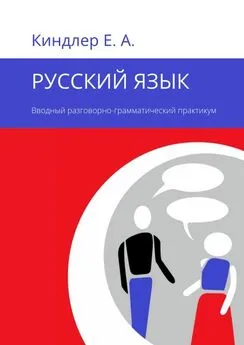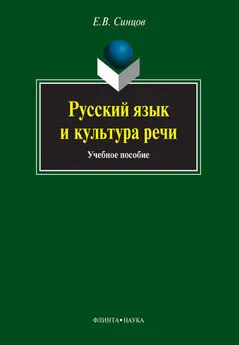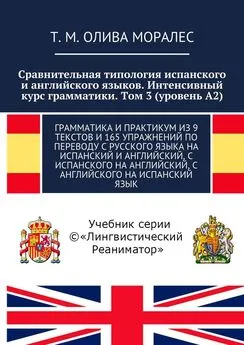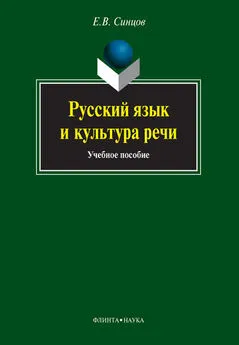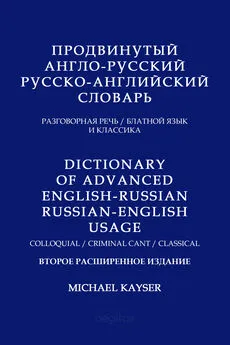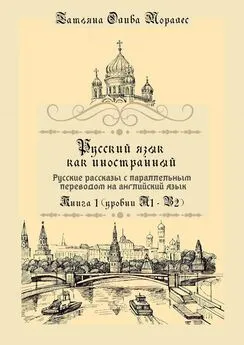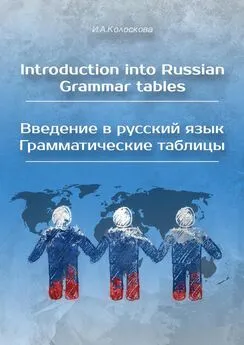Евгений Киндлер - Русский язык. Вводный разговорно-грамматический практикум
- Название:Русский язык. Вводный разговорно-грамматический практикум
- Автор:
- Жанр:
- Издательство:неизвестно
- Год:неизвестен
- ISBN:9785005612687
- Рейтинг:
- Избранное:Добавить в избранное
-
Отзывы:
-
Ваша оценка:
Евгений Киндлер - Русский язык. Вводный разговорно-грамматический практикум краткое содержание
Русский язык. Вводный разговорно-грамматический практикум - читать онлайн бесплатно ознакомительный отрывок
Интервал:
Закладка:
– Мне 21 год /23 года/19 лет
Упражнение 3. Say each other’s age
Ему 24 года (masculine)
Ей 24 года (femine)
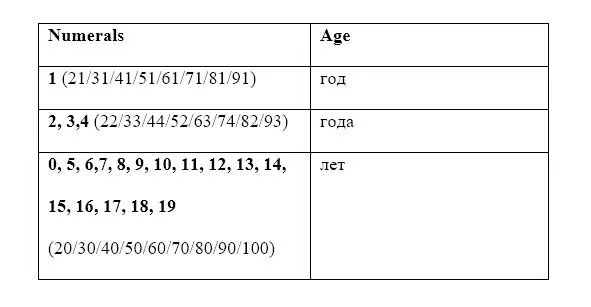
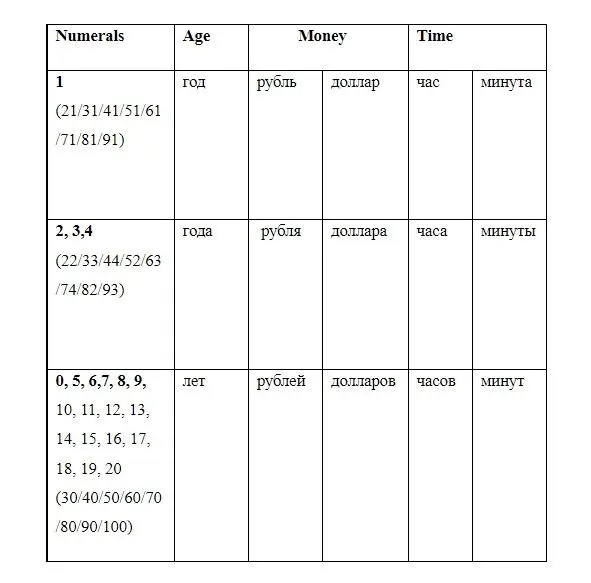
Упражнение 4. How much do these products approxmately cost in Russia and in your country?
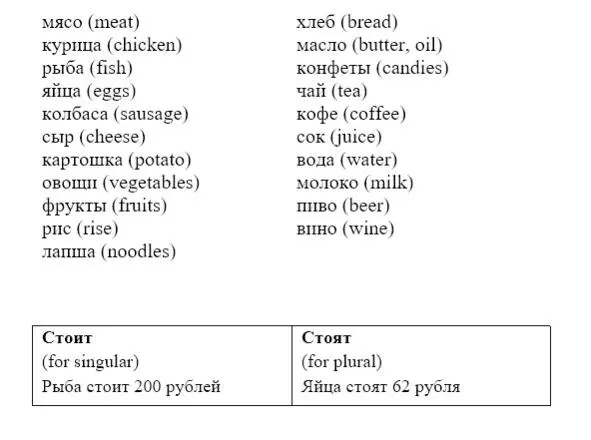
Упражнение 5. Say your address
Мой адрес – Улица (Street) Ленина
Дом (house) – 5
Квартира (flat) – 13
Упражнение 6. What time is it 2 2 There is a more complex way of indicating time. Watch the lesson 22
?
– Сколько времени?
– 11:23 (Одиннадцать часов, двадцать три минуты)
– Который час?
– 20:17 (Двадцать часов (восемь часов вечера), семнадцать минут)
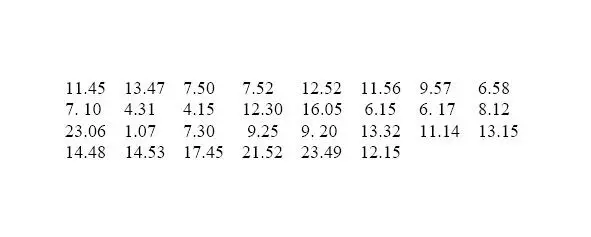
Упражнение 7. Read the numbers
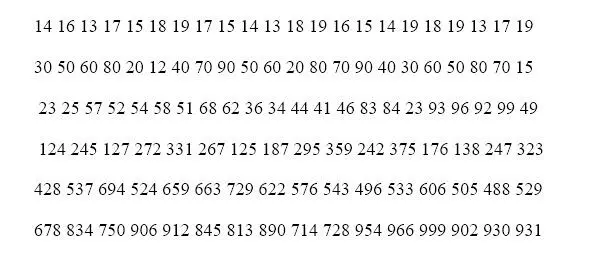
Упражнение 8. Write and read numbers
1018, 2016, 2046, 3084, 3023,4193, 4259,5342, 5475, 6554, 6766, 8899,9906
Урок 3 Личные, указательные и притяжательные местоимения Члены семьи, профессии. Lesson 3. Personal, demonstrative and possessive pronouns. Family members, professions
As you know, there are six cases in Russian: nominative, genitive, dative, accusative, instrumental and prepositional. Pronouns also vary in cases. In this tutorial, we’ll talk first about nominative, dative, accusative, and then about genitive. Consider for example the pronouns I. I’m nominative (who), me accusative (whom), me dative (to whom). Compare the following sentences in English and Russian.

For subject is used the nominative case. The accusative is used if somebody or something is not subject but object. The principal meaning of the accusative is to designate a person or thing to whom or which and action is being done. The dative case is used in Russian for the indirect object of a sentence. The indirect object is normally the person who receives the direct object.
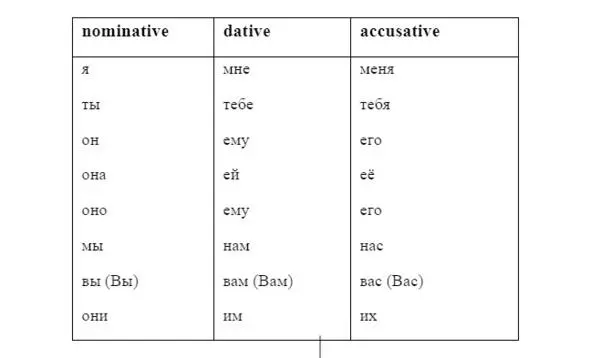
We have already said that the expression у меня есть means I have. This is a preposition, after which the genitive is used. Personal pronouns in the genitive case except он, она, оно have the same forms as in the accusative case. The primary meaning of the Russian genitive case is to show possession.
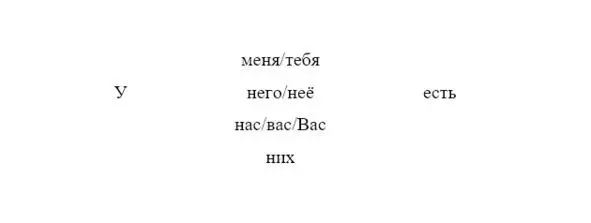
Упражнение 1. What family members do you have
Члены семьи (Family members)
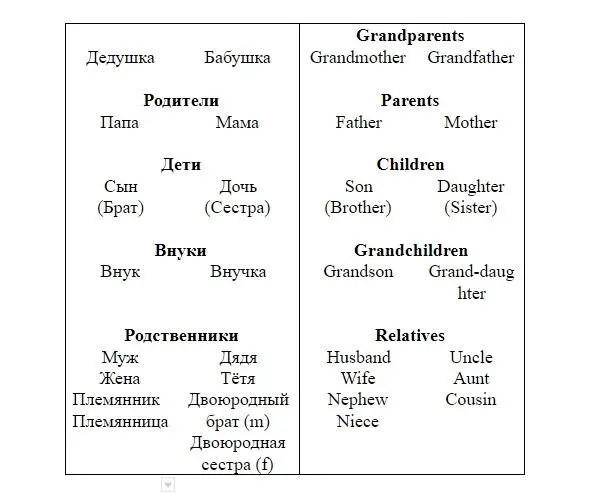
Grandparents 3 3 There are not a special word for «grandparents» in Russian.
У меня нет… – I do not have… 4 4 In Russian, the genitive case is used with negation. The endings of the nouns change. This is quite difficult, so remember only these word forms for now.
Дедушки
Бабушки
Родителей
Папы
Мамы
Детей
Сына (Брата)
Дочери (Сестры)
Внуков
Внука
Внучки
Родственников
Мужа
Жены
Дяди
Тёти
Племянника
Племянницы
Двоюродного брата
Двоюродной сестры
Упражнение 2. Tell about your family using the table.
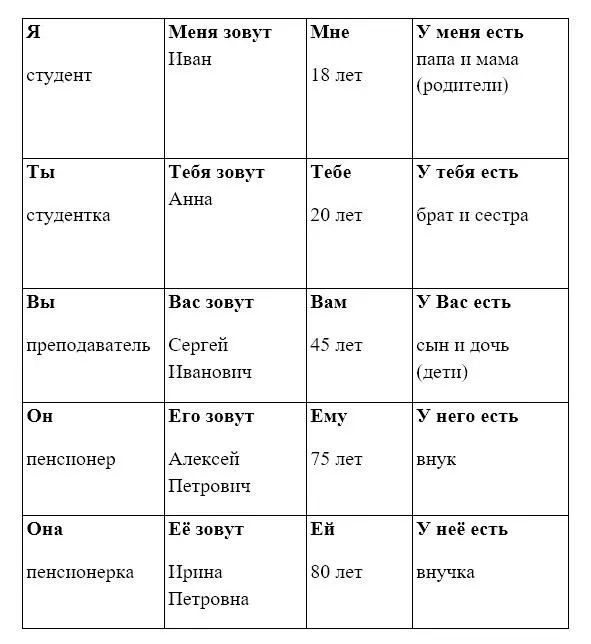
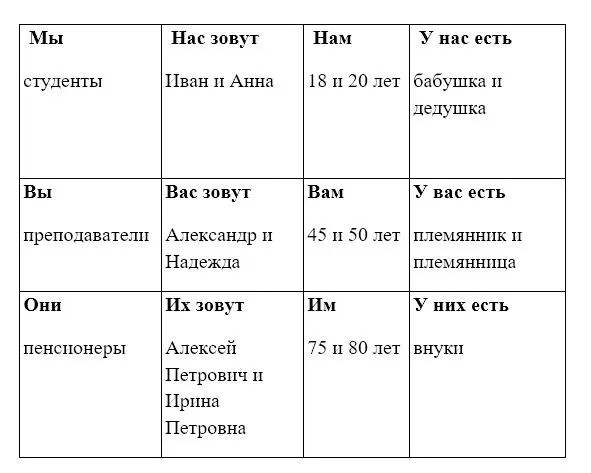
In the Russian language there are possessive pronouns. Possessive pronouns are a group of words indicating a sign of an object by its affiliation (something to someone) and answering questions whose (чей). They can be masculine, feminine, neuter or plural. The gender and number of possessive pronouns is determined by the noun in front of which they stand. For example: мой папа (m), моя мама (f), моё упражнение (n), мои родители (pl).
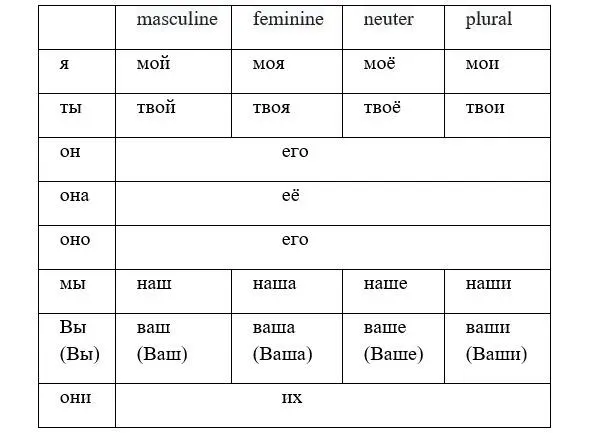
Упражнение 3. Indicate the possessive pronoun according to the gender and number of the noun.
For example,
мой, твой, его, её, наш, ваш папа (m)
моя, твоя, его, её, наша, ваша мама (f)
Члены семьи – Family members
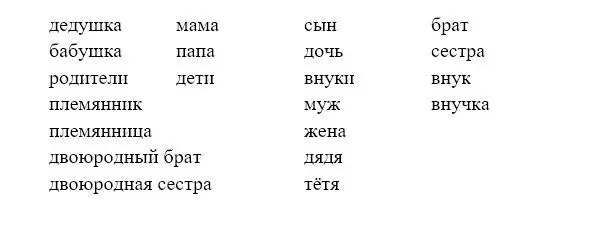
Учёба – Study
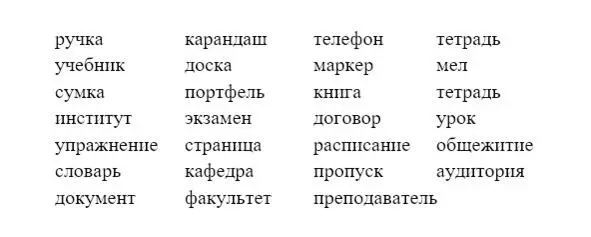
Еда и напитки – Food and drink
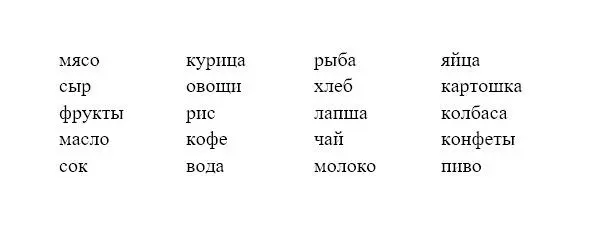
Профессия (profession)
Compare these words. You can see they’re alike. There are many borrowed and international words in Russian. English words with the ending « sion» are used in Russian with the ending « сия».
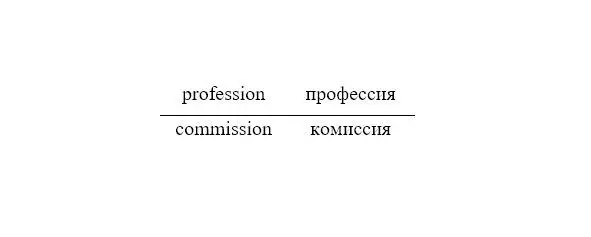
Nouns with the ending «tion» have the endings «ция».
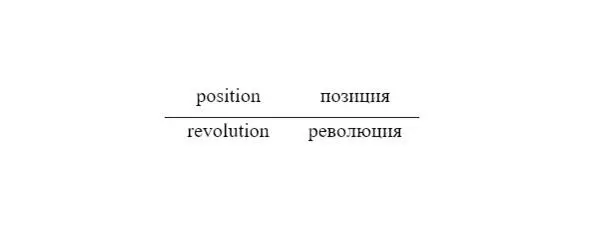
Of course, the meanings of such words in English and in Russian are not always identical.
Complection – color of skin.
Комплекция – body type.
Nevertheless, you already know several tens of thousands of such words, applying this scheme.
Кто ты (Вы, он, она) по профессии?
Я учитель (по профессии).
For some professions one word is used in Russian. For others different words are used depending on the gender.
!Учитель is used for the teacher at school, преподаватель is used for the teacher at university.
Упражнение 4. Make dialogs like these
– Кто твои родители по профессии?
– Мой папа по профессии инженер, а мама учительница
– У тебя есть братья и сёстры?
– У меня есть только брат.
– А кто он по профессии?
– Мой брат бизнесмен.
!Этот/ тот – this/that
Упражнение 6. Indicate the demonstrative pronouns according to the gender and number of the noun.
For example,этот, тот (папа)
эта, та (мама)
Урок 4. Глаголы несовершенного вида настоящего времени. Особые случаи глаголов
Lesson 4. Imperfective verbs of the present tense. Special cases of verbs
All verbs in Russian have an initial form with standard endings. Most verbs have an ending – ть. Less often – тиand very rarely – чь. In Russian – like in many other languages – a verb changes its ending for persons.
Дела -ть (to do)
я дела – ю
мы дела – ем
ты дела – ешь
вы (Вы) дела – ете
он/она/оно дела – ет
они дела - ют
You can see. To conjugate a verb, you need to replace the ending ть (ти, чь) with the others. There are 6 endings in the present tense. There are two groups of conjugations of verbs:
First conjugation –verbs ending with ать, ять(читать, объяснять)
Second conjugation –verbs ending with еть, ить(смотреть, учить)
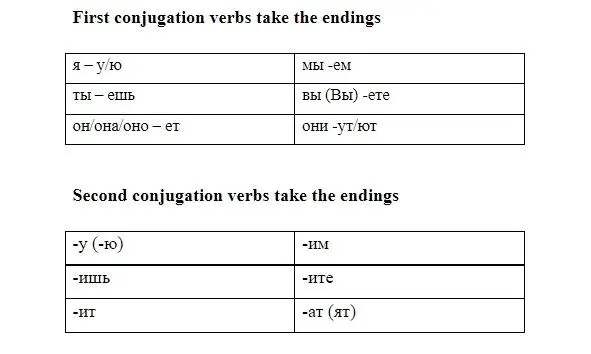
This is a general rule. There are exceptions and special cases that you must just remember. Let’s start with the first groupof verbs It is important to mention is that after 8 letters (к, г, ш, ж, щ, ч, х, ц) we don’t write the endings: -ю, -ют. We use the endings -у, -ут instead.

Понимать
Читать дальшеИнтервал:
Закладка:
